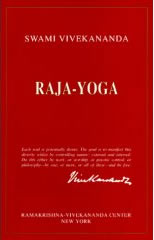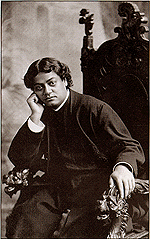Yama and Niyama |
|||
There are eight processes for thus restraining the mind. The first is Yama, controlling the mind by avoiding externals. All morality is included in this. Beget no evil. Injure no living creature. If you injure nothing for twelve years, then even lions and tigers will go down before you. Practise truthfulness. Twelve years of absolute truthfulness in thought, word, and deed gives a man what he wills. Be chaste in thought, word, and action. Chastity is the basis of all religions. Personal purity is imperative. Next is Niyama, not allowing the mind to wander in any direction. Raja-Yoga is divided into eight steps. The first is Yama--non-killing, truthfulness, non-stealing, continence, and non-receiving of any gifts. Next is Niyama--cleanliness, contentment, austerity, study, and self-surrender to God. Then comes Asana, or posture; Pranayama, or control of Prana; Pratyahara, or restraint of the senses from their objects; Dharana, or fixing the mind on a spot; Dhyana, or meditation; and Samadhi, or superconsciousness. The Yama and Niyama, as we see, are moral trainings; without these as the basis no practice of Yoga will succeed. As these two become established, the Yogi will begin to realise the fruits of his practice; without these it will never bear fruit. A Yogi must not think of injuring anyone, by thought, word, or deed. Mercy shall not be for men alone, but shall go beyond, and embrace the whole world.
The following are helps to success in Yoga and are called Niyama or regular habits and observances; Tapas, austerity; Svadhyaya, study; Santosha, contentment; Shaucha, purity; Ishvara-pranidhana, worshipping God. Fasting, or in other ways controlling the body, is called physical Tapas. Repeating the Vedas and other Mantras, by which the Sattva material in the body is purified, is called study, Svadhyaya. There are three sorts of repetitions of these Mantras. One is called the verbal, another semi-verbal, and the third mental. The verbal or audible is the lowest, and the inaudible is the highest of all. The repetition which is loud is the verbal; the next one is where only the lips move, but no sound is heard. The inaudible repetition of the Mantra, accompanied with the thinking of its meaning, is called the "mental repetition," and is the highest. The sages have said that there are two sorts of purification, external and internal. The purification of the body by water, earth, or other materials is the external purification, as bathing etc. Purification of the mind by truth, and by all the other virtues, is what is called internal purification. Both are necessary. It is not sufficient that a man should be internally pure and externally dirty. When both are not attainable the internal purity is the better, but no one will be a Yogi until he has both. Worship of God is by praise, by thought, by devotion. According to yoga philosophy, it is through ignorance that the soul has been joined with nature. The aim is to get rid of nature's control over us. That is the goal of all religions. Each soul is potentially divine. The goal is to manifest this Divinity within, by controlling nature, external and internal. Do this either by work, or worship, or psychic control, or philosophy--by one or more or all of these--and be free. This is the whole of religion. Doctrines, or dogmas, or rituals, or books, or temples, or forms, are but secondary details. The Yogi tries to reach this goal through psychic control. Until we can free ourselves from nature, we are slaves; as she dictates so we must go. The Yogi claims that he who controls mind controls matter also. The internal nature is much higher than the external and much more difficult to grapple with, much more difficult to control. Therefore he who has conquered the internal nature controls the whole universe; it becomes his servant. Raja-Yoga propounds the methods of gaining this control. Forces higher than we know in physical nature will have to be subdued. This body is just the external crust of the mind. They are not two different things; they are just as the oyster and its shell. They are but two aspects of one thing; the internal substance of the oyster takes up matter from outside, and manufactures the shell. In the same way the internal fine forces which are called mind take up gross matter from outside, and from that manufacture this external shell, the body. If, then, we have control of the internal, it is very easy to have control of the external. Then again, these forces are not different. It is not that some forces are physical, and some mental; the physical forces are but the gross manifestations of the fine forces, just as the physical world is but the gross manifestation of the fine world. (26th sutra of Patanjali) The means of destruction of ignorance is unbroken practice of discrimination.
(29th sutra of Patanjali). Yama, Niyama, Asana, Pranayama, Pratyahara, Dharana, Dhyana, and Samadhi are the eight limbs of Yoga. (30th sutra) Non-killing, truthfulness, non-stealing, continence, and non-receiving are called Yamas. Vivekananda's commentary: A man who wants to be a perfect Yogi must give up the sex idea. The soul has no sex; why should it degrade itself with sex ideas? Later on we shall understand better why these ideas must be given up. The mind of the man who receives gifts is acted on by the mind of the giver, so the receiver is likely to become degenerated. Receiving gifts is prone to destroy the independence of the mind, and make us slavish. Therefore, receive no gifts. 31. These, unbroken by time, place, purpose, and caste-rules, are (universal) great vows. Vivekananda: These practices--non-killing, truthfulness, non-stealing, chastity, and non-receiving--are to be practised by every man, woman, and child; by every soul, irrespective of nation, country, or position. 32. Internal and external purification, contentment, mortification, study, and worship of God are the Niyamas. Vivekananda: External purification is keeping the body pure; a dirty man will never be a Yogi. There must be internal purification also. That is obtained by the virtues named in I.33. Of course, internal purity is of greater value than external, but both are necessary, and external purity, without internal, is of no good. 33. To obstruct thoughts which are inimical to Yoga, contrary thoughts should be brought. Vivekananda: That is the way to practise the virtues that have been stated. For instance, when a big wave of anger has come into the mind, how are we to control that? Just by raising an opposing wave. Think of love. Sometimes a mother is very angry with her husband, and while in that state, the baby comes in, and she kisses the baby; the old wave dies out and a new wave arises, love for the child. That suppresses the other one. Love is opposite to anger. Similarly, when the idea of stealing comes, non-stealing should be thought of; when the idea of receiving gifts comes, replace it by a contrary thought. 34. The obstructions to Yoga are killing, falsehood, etc., whether committed, caused, or approved; either through avarice, or anger, or ignorance; whether slight, middling, or great; and they result in infinite ignorance and misery. Vivekananda: This is (the method of) thinking the contrary. If I tell a lie, or cause another to tell one, or approve of another doing so, it is equally sinful. If it is a very mild lie, still it is a lie. Every vicious thought will rebound, every thought of hatred which you may have thought, in a cave even, is stored up, and will one day come back to you with tremendous power in the form of some misery here. If you project hatred and jealousy, they will rebound on you with compound interest. No power can avert them; when once you have put them in motion, you will have to bear them. Remembering this will prevent you from doing wicked things. 35. Non-killing being established, in his presence all enmities cease (in others). Vivekananda: If a man gets the ideal of non-injuring others, before him even animals which are by their nature ferocious will become peaceful. The tiger and the lamb will play together before that Yogi. When you have come to that state, then alone you will understand that you have become firmly established in non-injuring. 36. By the establishment of truthfulness the Yogi gets the power of attaining for himself and others the fruits of work without the works. Vivekananda: When this power of truth will be established with you, then even in dream you will never tell an untruth. You will be true in thought, word, and deed. Whatever you say will be truth. You may say to a man, "Be blessed," and that man will be blessed. If a man is diseased, and you say to him, "Be thou cured," he will be cured immediately. 37. By the establishment of non-stealing all wealth comes to the Yogi. Vivekananda: The more you fly from nature, the more she follows you; and if you do not care for her at all, she becomes your slave. 38. By the establishment of continence energy is gained. Vivekananda: The chaste brain has tremendous energy and gigantic will-power. Without chastity there can be no spiritual strength. Continence gives wonderful control over mankind. The spiritual leaders of men have been very continent, and this is what gave them power. Therefore the Yogi must be continent. 39. When he is fixed in non-receiving, he gets the memory of past life. Vivekananda: When a man does not receive presents, he does not become beholden to others, but remains independent and free. His mind becomes pure. With every gift, he is likely to receive the evils of the giver. If he does not receive, the mind is purified, and the first power it gets is memory of past life. Then alone the Yogi becomes perfectly fixed in his ideal. He sees that he has been coming and going many times, so he becomes determined that this time he will be free, that he will no more come and go, and be the slave of Nature. 40. Internal and external cleanliness being established, there arises disgust for one's own body, and non-intercourse with others. Vivekananda: When there is real purification of the body, external and internal, there arises neglect of the body, and the idea of keeping it nice vanishes. A face which others call most beautiful will appear to the Yogi as merely animal, if there is not intelligence behind it. What the world calls a very common face he regards as heavenly, if the spirit shines behind it. This thirst after body is the great bane of human life. So the first sign of the establishment of purity is that you do not care to think you are a body. It is only when purity comes that we get rid of the body idea. 41. There also arises purification of the Sattva, cheerfulness of the mind, concentration, conquest of the organs, and fitness for the realisation of the Self. Vivekananda: By the practice of cleanliness, the Sattva material prevails, and the mind becomes concentrated and cheerful. The first sign that you are becoming religious is that you are becoming cheerful. When a man is gloomy, that may be dyspepsia, but it is not religion. A pleasurable feeling is the nature of the Sattva. Everything is pleasurable to the Sattvika man, and when this comes, know that you are progressing in Yoga. All pain is caused by Tamas, so you must get rid of that; moroseness is one of the results of Tamas. The strong, the well-knit, the young, the healthy, the daring alone are fit to be Yogis. To the Yogi everything is bliss, every human face that he sees brings cheerfulness to him. That is the sign of a virtuous man. Misery is caused by sin, and by no other cause. What business have you with clouded faces? It is terrible. If you have a clouded face, do not go out that day, shut yourself up in your room. What right have you to carry this disease out into the world? When your mind has become controlled, you have control over the whole body; instead of being a slave to this machine, the machine is your slave. Instead of this machine being able to drag the soul down, it becomes it greatest helpmate. 42. From contentment comes superlative happiness. 43. The result of mortification is bringing powers to the organs and body, by destroying the impurity. Vivekananda: The results of mortification are seen immediately, sometimes by heightened powers of vision, hearing things at a distance, and so on. 44. By repetition of the Mantra comes the realisation of the intended deity. Vivekananda: The higher the beings that you want to get the harder is the practice. 45. By sacrificing all the Ishvara comes Samadhi. Vivekananda: By resignation to the Lord, Samadhi becomes perfect.
|
- www.vivekananda.net edited by Frank Parlato Jr.

 Non-injury, truthfulness, non-covetousness, chastity, not receiving anything from another are called Yama. This purifies the mind, the Chitta. Never producing pain by thought, word, and deed, in any living being, is what is called Ahimsa, non-injury. There is no virtue higher than non-injury. There is no happiness higher than what a man obtains by this attitude of non-offensiveness, to all creation. By truth we attain fruits of work. Through truth everything is attained. In truth everything is established. Relating facts as they are--this is truth. Not taking others' goods by stealth or by force, is called Astya, non-covetousness. Chastity in thought, word, and deed, always, and in all conditions, is what is called Brahmacharya. Not receiving any present from anybody, even when one is suffering terribly, is what is called Aparigraha. The idea is, when a man receives a gift from another, his heart becomes impure, he becomes low, he loses his independence, he becomes bound and attached.
Non-injury, truthfulness, non-covetousness, chastity, not receiving anything from another are called Yama. This purifies the mind, the Chitta. Never producing pain by thought, word, and deed, in any living being, is what is called Ahimsa, non-injury. There is no virtue higher than non-injury. There is no happiness higher than what a man obtains by this attitude of non-offensiveness, to all creation. By truth we attain fruits of work. Through truth everything is attained. In truth everything is established. Relating facts as they are--this is truth. Not taking others' goods by stealth or by force, is called Astya, non-covetousness. Chastity in thought, word, and deed, always, and in all conditions, is what is called Brahmacharya. Not receiving any present from anybody, even when one is suffering terribly, is what is called Aparigraha. The idea is, when a man receives a gift from another, his heart becomes impure, he becomes low, he loses his independence, he becomes bound and attached.  Vivekananda's commentary: This is the real goal of practice--discrimination between the real and the unreal, knowing that the Purusha is not nature, that it is neither matter nor mind, and that because it is not nature, it cannot possibly change. It is only nature which changes, combining and re-combining, dissolving continually. When through constant practice we begin to discriminate, ignorance will vanish, and the Purusha will begin to shine in its real nature--omniscient, omnipotent, omnipresent.
Vivekananda's commentary: This is the real goal of practice--discrimination between the real and the unreal, knowing that the Purusha is not nature, that it is neither matter nor mind, and that because it is not nature, it cannot possibly change. It is only nature which changes, combining and re-combining, dissolving continually. When through constant practice we begin to discriminate, ignorance will vanish, and the Purusha will begin to shine in its real nature--omniscient, omnipotent, omnipresent.